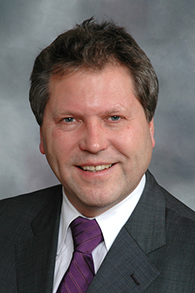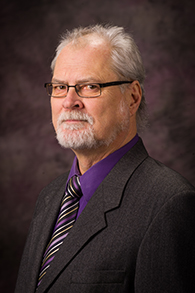World's largest scientific society names two Kansas State University researchers as 2018 fellows
Wednesday, Nov. 28, 2018
MANHATTAN — A Kansas State University infectious disease researcher and a late biology professor have been named 2018 fellows of the American Association for the Advancement of Science, or AAAS.
The two Kansas State University fellows:
• Jürgen Richt, Regents distinguished professor and director of the university's Center of Excellence for Emerging and Zoonotic Animal Diseases, or CEEZAD, for distinguished research and advisory contributions to the field of zoonotic diseases, particularly for his pioneering role in the development of the One Health paradigm.
• James Guikema, late professor of biology and university administrator, for distinguished contributions to the fields of photosynthesis and gravitational biology, and in research administration at Kansas State University and the NASA Specialized Center of Research and Training, or NSCORT.
Richt and Guikema are among 416 fellows chosen this year by the American Association for the Advancement of Science, which is the world's largest scientific society. Election as a fellow is an honor bestowed upon association members by their peers. The association's fellowship program recognizes individuals whose efforts toward advancing science applications are deemed scientifically or socially distinguished.
This year's fellows will be formally announced in the AAAS News and Notes section of the journal Science on Nov. 29. Richt and Guikema will be recognized at a certificate and pinning ceremony on Feb. 16, 2019, during the association's annual meeting in Washington, D.C.
Richt and Guikema join 21 current and emeritus Kansas State University faculty members who are fellows of the association.
"Our 2018 fellows are truly deserving of this recognition for their career accomplishments," said Peter Dorhout, the university's vice president for research. "Dr. Richt is a distinguished leader in zoonotic diseases whose work has improved animal and human health throughout the world. In a special way, this distinction by AAAS helps us remember and honor Dr. Guikema and his countless contributions to the field of biology during his service to Kansas State University."
Richt is a veterinary microbiologist who has worked with multiple agents of zoonotic potential, including bovine spongiform encephalopathy or mad cow disease, chronic wasting disease, animal influenza viruses, Rift Valley Fever virus, Borna virus and other emerging pathogens. Richt's career, which includes a seven-year assignment as lead scientist at the U.S. Department of Agriculture's National Animal Disease Center, has been spent developing novel vaccines and testing methods and remedies for a number of animal and zoonotic diseases.
Richt joined Kansas State University in 2008 as Regents distinguished professor and Kansas Bioscience eminent scholar in the College of Veterinary Medicine's department of diagnostic medicine and pathobiology. Richt became the director of the Department of Homeland Security's Center of Excellence for Emerging and Zoonotic Animal Diseases at Kansas State University in 2010. As director, he leads an international network for scientific research involving multiple U.S. universities, foreign universities, and various industry and foreign partners.
Richt has authored or co-authored more than 200 peer-reviewed articles. His work has been published extensively, including in such prestigious journals as Nature Biotechnology, Science, Journal of Experimental Medicine, PNAS, Cell Host Microbe and Journal of Virology. In 2011, Richt received the Pfizer Animal Health Award for Research Excellence and in 2014 the Kansas State University Iman Outstanding Faculty Award for Research.
Guikema devoted decades to Kansas State University as an administrator and professor of biology. He died in April 2018.
Guikema joined the Division of Biology in 1981 and spent 37 years of teaching, research, service and administration at the university. He rose through the ranks to be named associate director of the Division of Biology. His research program in plant sciences transitioned into gravitational and space biology, with multiple experiments on the space shuttle.
In 1998, Guikema became the university's associate dean of the graduate school and associate vice president for research. After 17 years, he returned to the Division of Biology to serve again as associate director. During his dedicated service in the university's central administration, he mentored students and young faculty and supported novel research and scholarly pursuits.
Guikema received a bachelor's degree from Calvin College in Michigan and a doctorate in photosynthesis from the University of Michigan. He served a two-year postdoctoral position at the University of Missouri, where he met his wife of 31 years, Sue Brown, a Kansas State University distinguished professor of biology.


